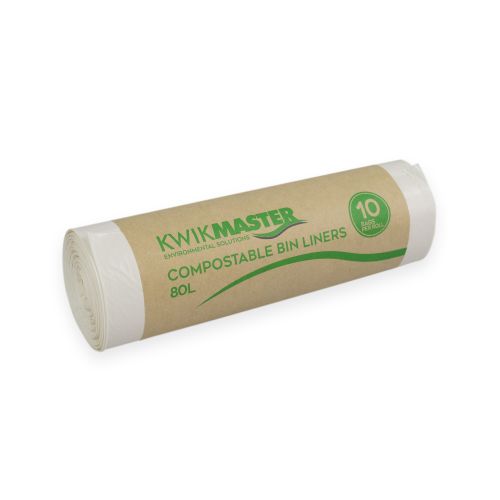For anyone who has ever turned organic waste into compost, it’s hard to go back. Seeing plant matter and food leftovers transformed into the rich, sweet-smelling resource that farmers and gardeners call “black gold” generally makes people swear never again to throw organic waste into landfill, where all it will do is produce the powerful greenhouse gas methane.
However, for businesses, organic waste can offer logistical challenges. That waste needs to be managed in the right way if it is to be processed sustainably. In many situations, compostable bin liners can be the missing piece of the puzzle.
Often made from plant-based materials, compostable bin liners are specifically designed to break down into compost within a defined time frame, whether in an industrial or home composting system. Whether a business is having its green waste collected by council or runs its own composting program, compostable bin liners can offer a neat, hygienic way of getting green waste to the compost heap, where it can all be thrown in together – liner and all.
“Compostable bin liners are designed to break down into natural compost within a defined time frame, typically in industrial or home composting environments,” says Bunzl Australia and New Zealand’s Sustainability Manager, Nasim Aflatoon. “In contrast, a biodegradable bin liner may break down into smaller pieces over time, but not necessarily turn into compost or fully decompose.”
Aflatoon says it’s worth noting these distinct differences if you’re looking for a more sustainable alternative to virgin plastic. “The term biodegradable doesn’t have any clear certifications or classifications, meaning that it can describe anything,” she explains.
“In contrast, compostability is a well-defined concept, backed by certifications such as AS4736 and AS5810 and BPI.”
Another key factor to consider is the environment and conditions in which you’ll be using these bin liners. Businesses should choose the right bin liner for their applications, Aflatoon says. Compostable bin liners are best for workplaces and industries that generate organic waste, such as food service establishments, hospitality venues (such as restaurants, hotels and commercial kitchens), agricultural environments, or office kitchens that want to compost their waste.
Aflatoon also explains that other alternatives are more suitable for general waste collection, where organic waste is not the main concern or waste stream. In this situation, businesses looking for a sustainable option can consider liners made from recycled content.
As businesses across Australia and New Zealand continue to look for ways to reduce the use of virgin materials, utilising products like compostable bin liners where appropriate is a simple way to stay on track.
See the range below
